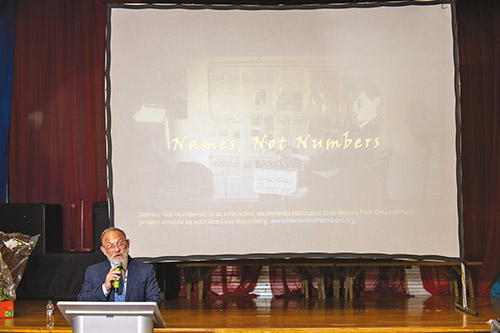
(Courtesy of SAR Academy) Fewer than 50,000 Holocaust survivors remain in the U.S. The youngest survivors are now in their 80s. Antisemitism and violence against Jewish people are on the rise.
This has spurred museums and librarians around the world to race to collect testimonies from Holocaust survivors.
SAR Academy in Riverdale has continued to do its part to contribute to this effort by participating in “Names, Not Numbers©,” an oral Holocaust history film project and has incorporated the program into the greater eighth-grade curriculum.
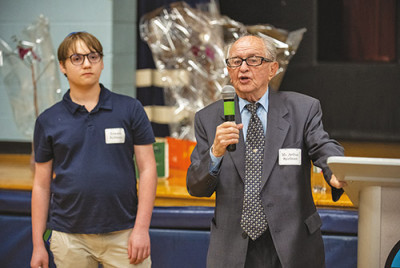
Founded by Tovah Fish-Rosenberg, “Names, Not Numbers©” trains students in the U.S, Canada and Israel in basic documentary practices. The students interview and film survivors and together with a professional filmmaker, edit the footage into a final film.
SAR’s eighth-grade students completed the two-month documentary curriculum and premiered their 90-minute film on June 1, which featured the stories of eight survivors. Over the past 14 years, SAR students have recorded more than 80 survivors through the “Names, Not Numbers©” program and the raw footage is archived in the Yad Vashem museum in Israel.
While SAR’s goal with the “Names, Not Numbers©” program has remained the same, the project now also dovetails with the general eighth-grade Holocaust education.
Several years ago, “Names, Not Numbers©” was an optional after-school elective, which competed with activities like art and basketball. It’s now a requirement and embedded in the eighth-grade curriculum.
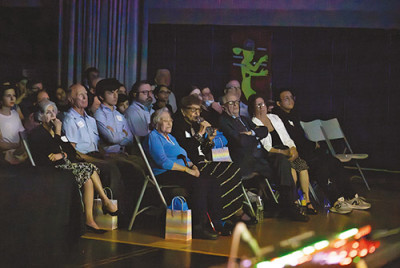
“There’s not that much time left,” said Elayna Koevary, an eighth-grade social studies teacher and the coordinator of “Names, Not Numbers©” program at SAR Academy. “If we don’t give them the opportunity now to meet Holocaust survivors, we don’t know if — or when — the opportunity will come up again.”
The program has also evolved into a multidisciplinary and intergenerational unit which spans about five months.
It begins in November with a trip to the Holocaust Memorial Museum in Washington, D.C., where the students are free to explore the museum on their own. A month later, they dive into a comprehensive Holocaust unit in social studies. In English class, the students read “Night” by Elie Wiesel and grapple with heavy themes, including resistance, Wiesel’s struggle to maintain belief in God and the difficult question of who is responsible for society’s sins: the individual or society?
Then, over a period of two months, the students research their assigned Holocaust survivor, learn basic journalistic and filming practices, interview their survivors and select clips for the film.
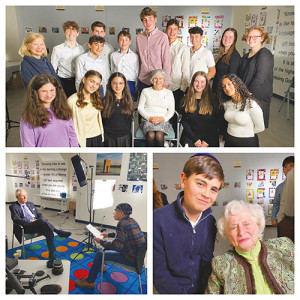
“This program embodies everything we believe in at SAR. Everything we do is experiential,” said Koevary. “It’s building connections. It’s making learning epic and memorable. It’s putting the kids in the driver’s seat — being the historian and asking the questions as opposed to just being the recipient of knowledge.”
To expand the reach of the initiative, SAR also partners with Atmosphere Academy, a local charter school, and 25 students this year participated in the program. To help prepare the Atmosphere students for the experience, Debby Ziering — who sponsors “Names, Not Numbers©” at SAR — gives preliminary lessons about Judaism, Jewish culture, and the rise of Adolf Hitler in Germany.
At SAR, “Names, Not Numbers©” also enables students to more deeply consider the topic of the “universe of obligation,” which delves into the idea of communal responsibility and taking care of one another. It’s an issue that’s explored across all eighth-grade English and social studies classes.
This idea came up when Abe Foxman, former director of the Anti-Defamation League and one of the participating survivors, addressed the grade several months ago and it’s something the students have continued to keep in mind.
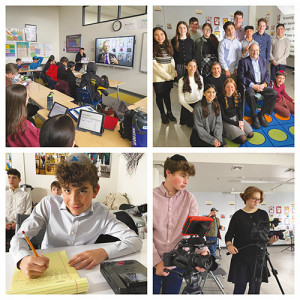
Foxman shared how his nanny in Poland risked her life to hide and protect him during the Holocaust. He urged the students to follow her example — without having to risk their lives — by standing up against bullying and hate.
“Of course, the overriding message is ‘never forget,’” said Koevery. “But it’s also about resilience and being an upstander and stopping hate, prejudice and discrimination. The takeaway messages are universal in nature.”









